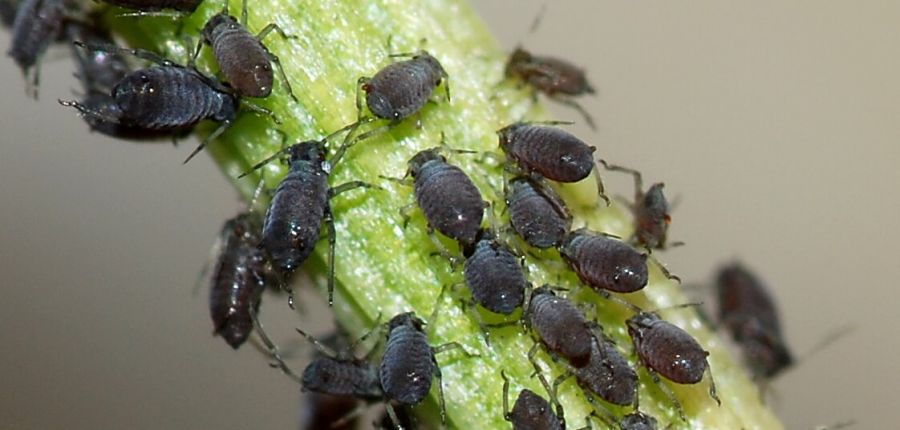Broad beans – and the dreaded blackfly!
Posted By: rocket veg Category: Growing Veg, Pests and Diseases, Seasonal AdviceUntil last week, I thought I’d been lucky and my crop of broad beans, sown last autumn and having survived a prolonged winter with two falls of snow, would remain free of blackfly…only to discover dense clusters of the little beasts surrounding the top-most foliage. Gardening lore has it that broad bean plants which over-winter are less likely to be attacked by blackfly than beans sown in the spring but there are years when this doesn’t hold true – and this seems to be one of them. Left unchecked, blackfly multiply rapidly and in no time at all, strong, green and healthy broad bean plants are soon reduced to miserable-looking specimens with shrivelled flowers and weakened foliage.
What are blackfly?
The name is a perfect descriptor for this little pest – a tiny aphid which sucks the sap from the new and tender growth of a range of plants. Much to the consternation of vegetable growers, blackfly are especially attracted to broad beans, forming thick clusters around the new leaves at the top of the plants, the stems and on the underside of younger leaves. Worse still, they congregate on the flower buds, stifling growth of the tiny bean shoots and thereby damaging the developing pods. A bad infestation of blackfly will seriously weaken plants, resulting in stunted growth of broad beans and the flower buds of ornamental plants, such as dahlias, poppies and nasturtiums.
While they are busy doing their work, the black aphids secrete a sugary honeydew which attracts ants, often to be spotted making their way up and down the plant stems and leaves in search of a sweet treat, but also feasting off other insects, some of which are natural predators of blackfly.
Prevention and control of blackfly on broad beans
As with all garden pests, prevention is better than control, so check plants which are likely to become infested - such as broad beans - from early spring onwards and use a brush to remove small clusters of blackfly before they increase and spread.
Aphids such as blackfly have many predators – ladybirds in particular – but don’t assume that a few ladybirds are able to deal with a bad infestation of blackfly. Large numbers of aphids often build up on plants before their natural enemies are active in sufficient numbers to gain control and reduce the problem, but you can help to overcome this by using bio control, whereby large numbers of a specific native predator is introduced into a small area to swell the numbers which naturally occur.
A gardeners’ trick is to pinch off the tips of broad bean plants before blackfly appear in order to remove a favourite feeding point. Not only does this address the problem, but it also encourages better growth and development of strong pods and besides, broad bean tips, gently steamed and covered with melted butter, delicately flavoured with garlic and a good grind of black.
Some gardeners favour ‘companion planting’, whereby one type of plant assists another in close proximity. If planted close to broad beans, nasturtiums – a favourite food of blackfly – may well reduce the interest of blackfly in your precious crop of broad beans.
As a last resort, various chemical sprays are available and provide effective treatment of blackfly, but before resorting to one of these, try spraying the affected plants with a simple mix of water with a few drops of washing up liquid added. It really does the trick.







